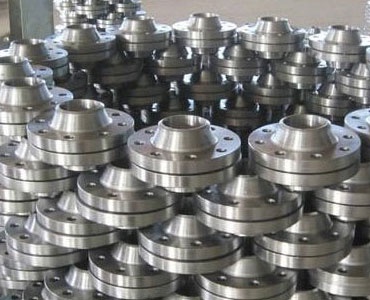The Inconel line of nickel-chromium-molybdenum alloys, which includes Inconel 600, 601, 625, 686, 718, and 725 flanges, are well known for their high strength at high temperatures and corrosion resistance.
Due to their high alloy composition, Inconel Flanges can withstand a variety of severe corrosive environments. In moderate environments including the atmosphere, seawater, basic salts, and alkaline media, Inconel 625 Flanges flanges are virtually unaffected by attack. In more severe corrosive environments, the combination of nickel and chromium provides resistance to oxidising chemicals; yet, the high nickel and molybdenum levels provide resistance to non-oxidizing environments.
There are various Inconel flange types. A welding neck flange features a long, tapered hub that may join with a pipe. When used, it is used to demand an unrestricted flow of the fluid transported by the piping system in high-pressure and high/low temperature applications.
The neck (tapered hub) of long weld neck flanges is expanded and serves as a boring extension.
A slip-on flange is joined to the pipe or fittings by two fillet welds, one of which is inside the cavity of the flange and the other outside.
Threaded flanges are used to attach to pipes without the use of seam welds by screwing the pipe onto the flange.
Using a single fillet weld on the flange's outside edge, socket weld flanges are connected to pipes.
Flat-faced lap joint flanges must always be utilised with a stub end. With the exception of the radius at the flange face/bore junction to accommodate the flanged portion of the stub end, lap joint flanges resemble slip-on flanges in terms of form.
Because of the pressure in the system and the required attachment forces, blind flanges must withstand high mechanical stress. Because they may be rapidly unbolted to allow the operator to work within the pipe's terminal end, blind flanges make it simple to access pipelines.
Inconel has a wide range of uses and is frequently utilised in high performance equipment because of its dependability under challenging conditions. Additionally, it is utilised in the gas and oil sectors, power plants, pump motor shafts, and chemical industries.
From nuclear power to spectator sports, nickel alloy and inconel have made their way into a variety of high-pressure settings. It is acceptable to assume that it is an important material grade and an obvious choice for many engineers who want to create a well-functioning and reliable product.
One of the strongest and most resilient materials on the market, Inconel is also sufficiently adaptable to be used in a variety of applications.
The Flanges are perfect for high-temperature applications because they maintain strength across a broad temperature range. These are offered in a range of diameters, wall thicknesses, and sizes to key clients at incredibly low pricing.


No comments yet